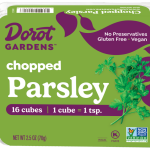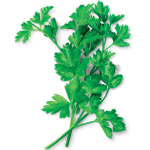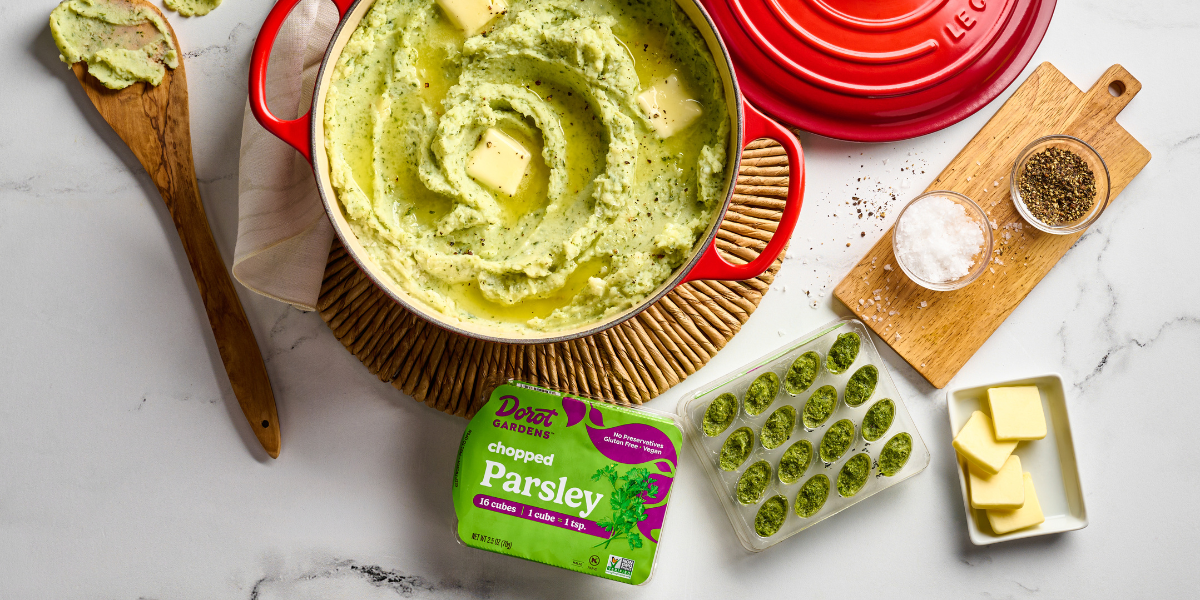What is parsley? Parsley is a versatile herb that’s more than just a garnish. It’s a nutritional powerhouse that can add a fresh, vibrant touch to your meals. This leafy green herb has been grown for over 2,000 years, and is used in foods around the world for its unique flavor and health benefits. Let’s explore the world of parsley!
What is Parsley: Key Takeaways
- Parsley is a versatile herb with two main varieties: curly and flat-leaf
- It’s packed with vitamins A, C, and K, as well as antioxidants
- Parsley offers potential health benefits for bones, eyes, and heart
- This herb is widely used in cooking for flavor and as a garnish
- Proper storage can keep parsley fresh for up to two weeks
- Parsley has been used medicinally for centuries
- It’s low in calories, but high in nutritional value
Understanding Parsley: Types and Characteristics
Parsley comes in two main types: curly leaf and flat-leaf (also known as Italian parsley). Both kinds have unique flavors and uses in cooking. Knowing the differences can help you pick the best type for your meals.


Curly parsley has ruffled, darker green leaves with a milder flavor. It’s often used as a garnish, and is more widely seen in French cuisine. Flat-leaf parsley has broad, flat leaves with a stronger, slightly peppery taste. It’s more popular for cooking and is used a lot in Italian, Middle Eastern, and Mediterranean dishes. The stronger flavor of flat-leaf parsley also makes it great for sauces, soups, and stews.
Dorot Gardens offers pre-chopped parsley that brings the fresh taste of parsley kitchen, alongside incredible convenience! This easy option lets you enjoy fresh parsley all year, saving time while making your meals taste great.
Nutritional Benefits of Parsley
Parsley isn’t just tasty – it’s full of nutrients that are good for you. Here’s what this little herb offers:
What is Parsley’s Typical Nutritional Value?
(% Daily Value per 1/2 cup)
Vitamin A
Vitamin C
Vitamin K
Folate
Iron
With its high vitamin content, parsley can help your immune system and make your bones stronger. The vitamin A in parsley is important for good eyesight and healthy skin, while the vitamin C boosts your immune system, and also helps your skin heal from cuts, grazes etc. The high levels of vitamin K in parsley help your blood clot and keep your bones strong.
What is Parsley Used for in Cooking?
Parsley is great for cooking! Its fresh, slightly spicy flavor can make many dishes taste better. Professional chefs and home cooks all over the world use parsley in lots of different ways. Here are some ways you can use parsley in your cooking:
- As a garnish: Sprinkle chopped parsley on soups, salads, or main dishes to make them look pretty and taste fresh.
- In herb mixes: Use it in herb mixes for flavoring soups and stews.
- In sauces: It’s a key ingredient in some iconic sauces – including chimichurri sauce and pesto.
- In salads: Parsley can be incorporated into green salads or use it as the main ingredient in tabbouleh, a Middle Eastern salad.
- In marinades: Add chopped parsley to marinades for meat, fish, or vegetables to give them more flavor.
- In compound / flavored butter: Mix chopped parsley with soft butter to spread on bread or melt over cooked meats.
- In smoothies: Add some parsley to your green smoothies for more nutrients and a fresh taste.
Check out our recipes for more tasty ways to use our frozen parsley cubes in your cooking! From easy weeknight dinners to fancy dishes for parties, our recipes will help you use this versatile herb in lots of ways.
What are the Benefits of Parsley
Parsley isn’t just for making food taste good – it’s also great for your health! There are many reasons why adding more parsley to your diet can benefit your overall health – including the following:
1. Antioxidant Powerhouse: Parsley contains lots of antioxidants which help protect the cells in your body from damage, and may help lower the risk of some long-term diseases.
2. Supports Bone Health: The high amount of vitamin K in parsley helps your body use calcium, keeping your bones strong and potentially lower the risk of fractures and similar bone injuries.
3. Promotes Heart Health: Parsley contains folate, which might help lower the risk of heart disease by reducing levels of a substance called homocysteine in your blood. High levels of homocysteine have been linked to a higher risk of heart disease and stroke.
4. Aids Digestion: The fiber in parsley can help keep your gut healthy and regular. People have also used parsley for a long time to help with bloating and gas.
5. Anti-Inflammatory Properties: Certain compounds in parsley, like vitamin C and flavonoids, can help reduce inflammation in your body.
6. Supports Kidney Function: Parsley has mild diuretic properties, which means it might help flush out toxins and support kidney health.
Why Choose Frozen Parsley Over Fresh?
The short answer is ‘because fresh parsley can go bad quickly, and can require a lot of prep’. That’s what makes Dorot Gardens’ pre-chopped frozen parsley cubes a much more convenient option. They’re always ready to use and will last for up to two years in the freezer – offering that great fresh parsley flavor all year round, with no more effort than a simple ‘pop, drop, done’ required.
